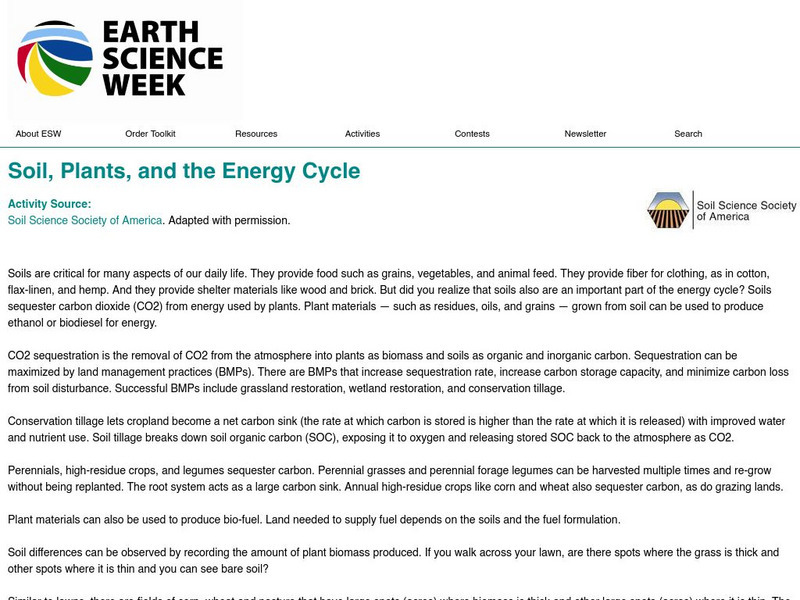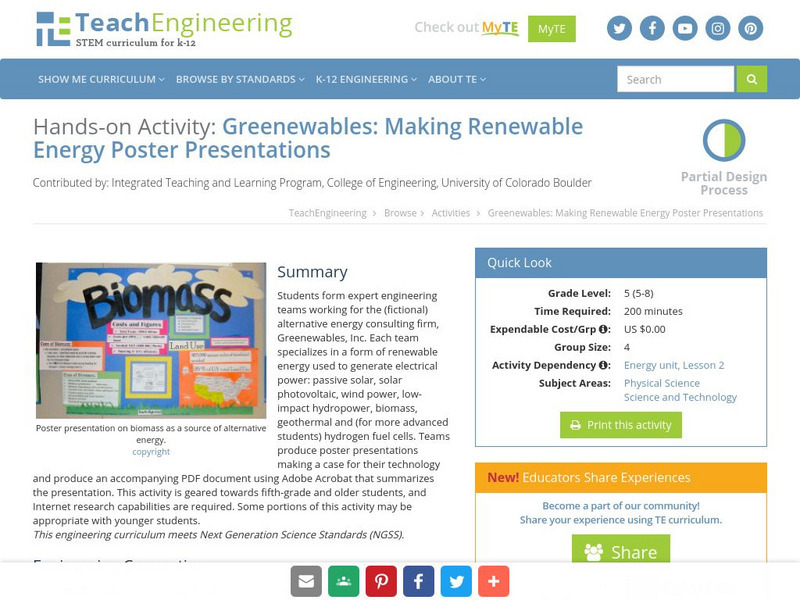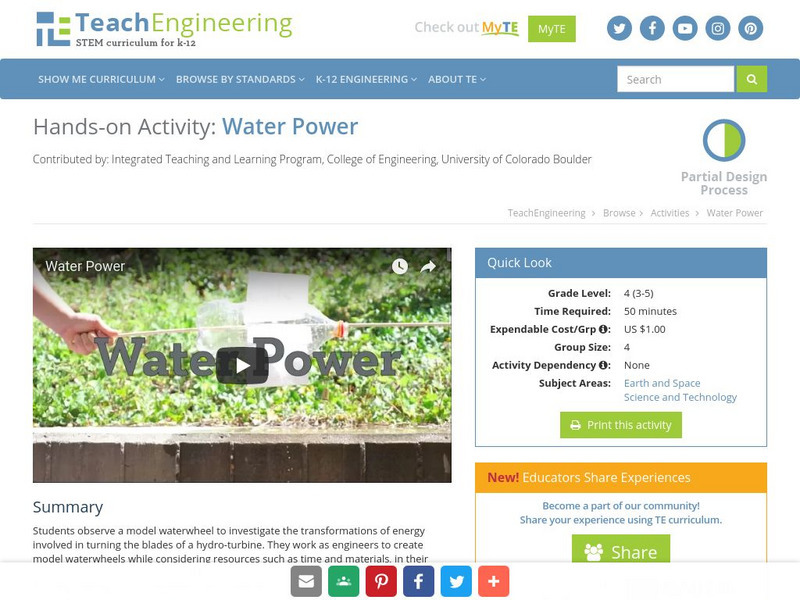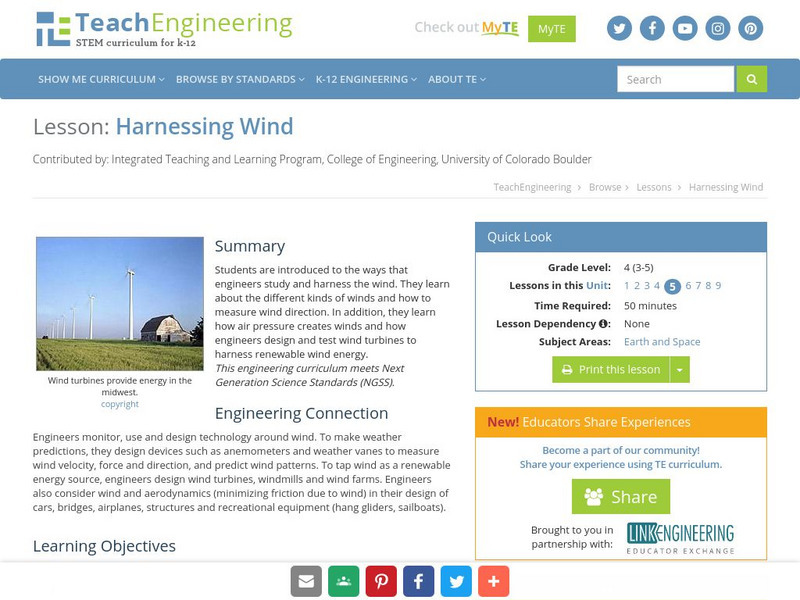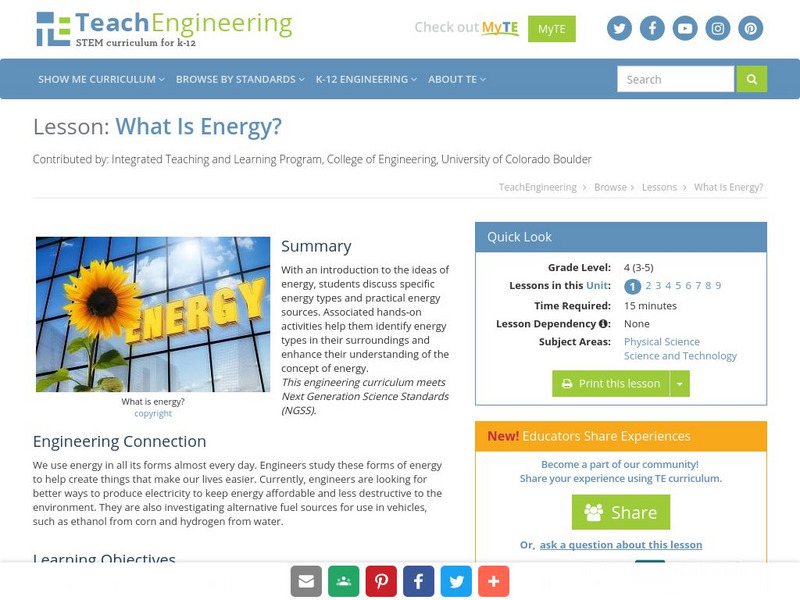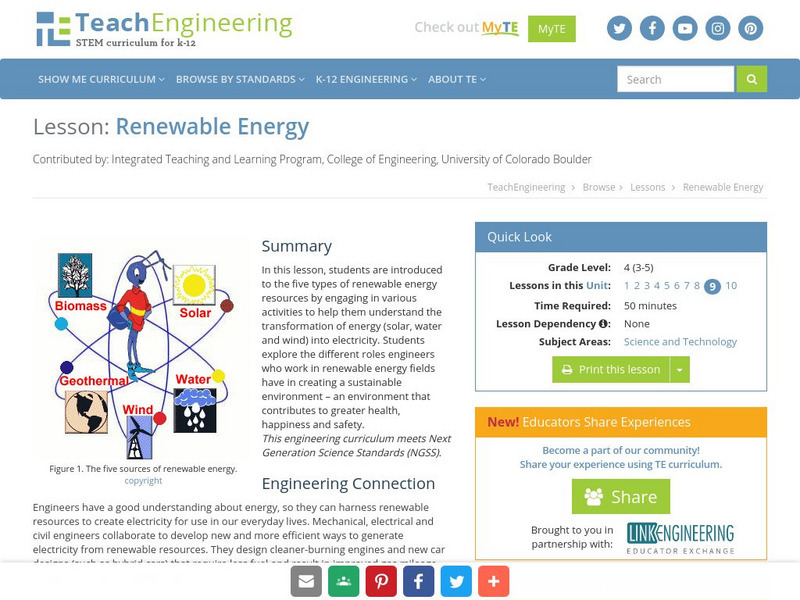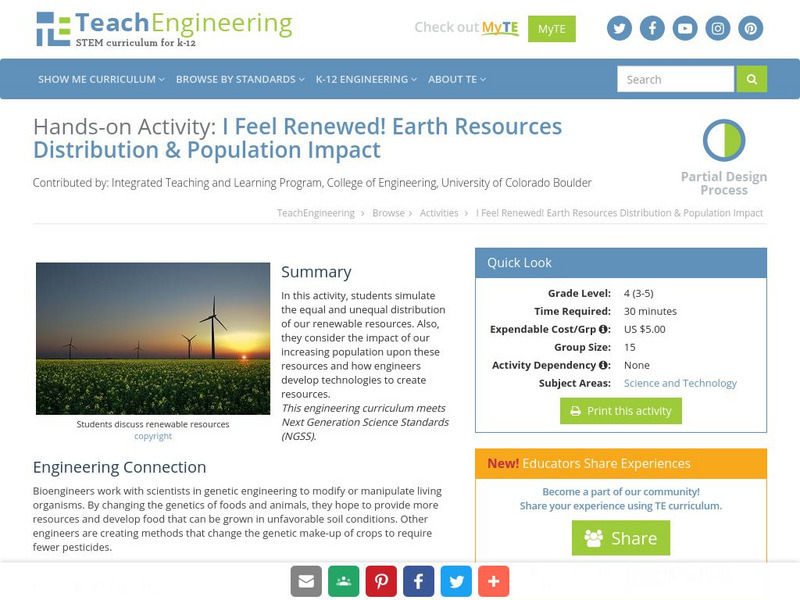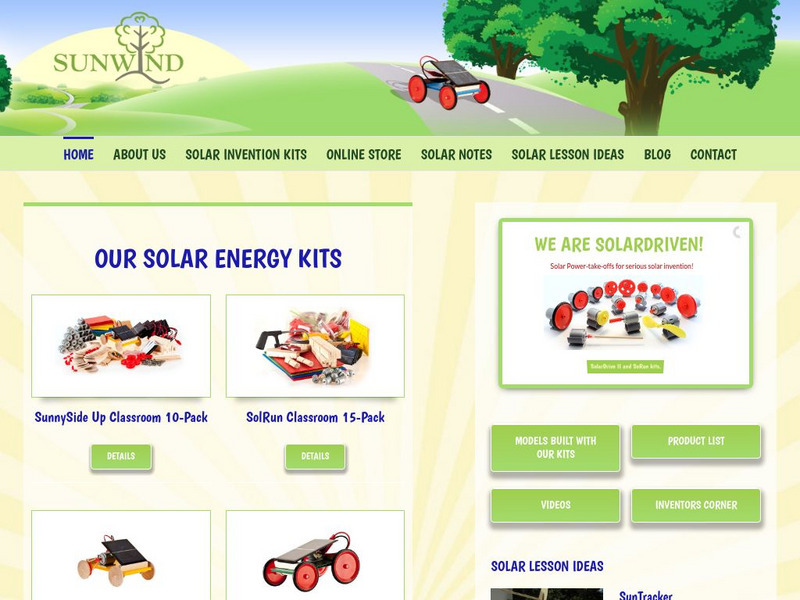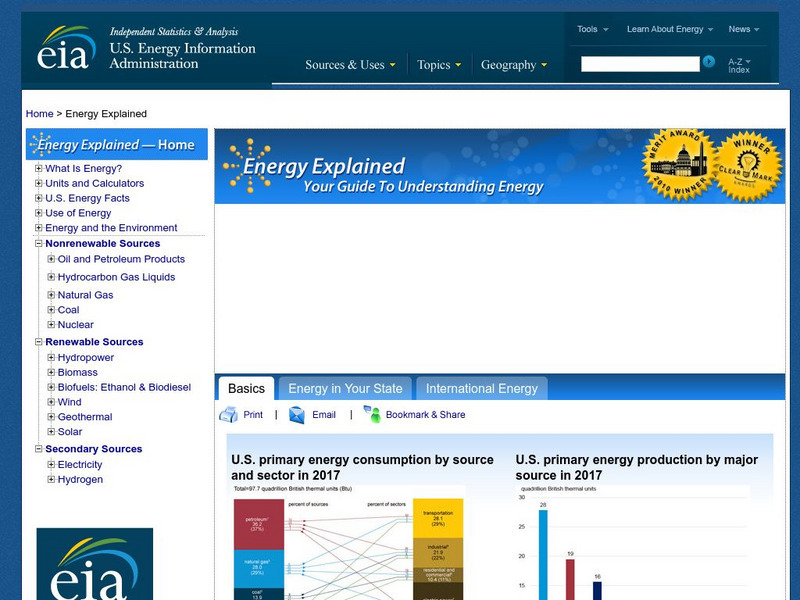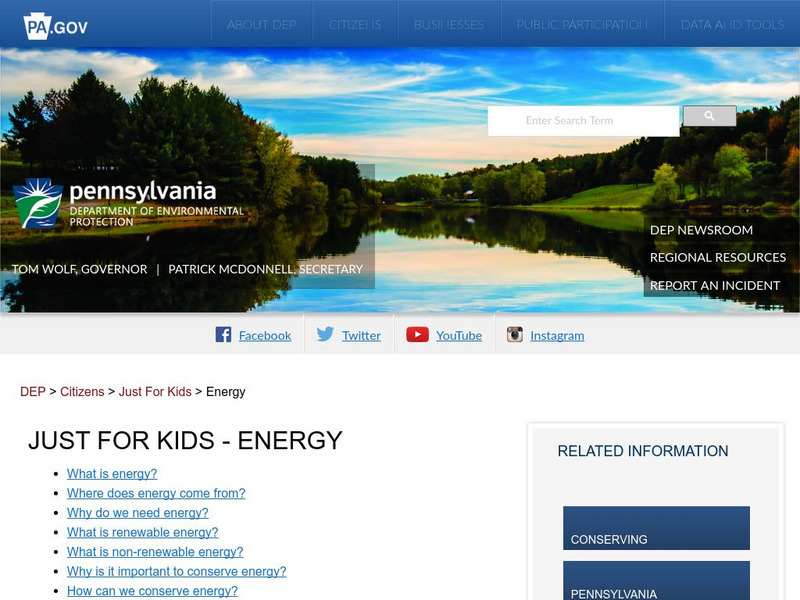American Geosciences Institute
American Geosciences Institute: Earth Science Week: Soil, Plants, and the Energy Cycle
Students explore what kind and how much bio-mass can be produced in an area around your city or town. They figure how many gallons of fuel can be expected from one acre of crop land, and how much carbon can be sequestered in the local area.
TeachEngineering
Teach Engineering: Powering Smallsburg
In this activity, students act as power engineers by specifying the power plants to build for a community. They are given a budget, an expected power demand from the community, and different power plant options with corresponding...
TeachEngineering
Teach Engineering: Greenewables
Students form expert engineering teams working for the (fictional) alternative energy consulting firm, Greenewables, Inc. Each team specializes in a form of renewable energy used to generate electrical power: passive solar, solar...
TeachEngineering
Teach Engineering: Wind Power
In this activity, students develop an understanding of how engineers use wind to generate electricity. They will build a model anemometer to better understand and measure wind speed.
TeachEngineering
Teach Engineering: Water Power
In this activity, students observe a model of a waterwheel to investigate the transformations of energy involved in turning the blades of a hydro-turbine into work. Students work as engineers to create a model for a new waterwheel while...
TeachEngineering
Teach Engineering: Harnessing Wind
This lesson introduces the ways that engineers study and harness the wind. Students will learn about the different kinds of winds and how to measure wind direction. In addition, students will learn how air pressure creates winds and how...
TeachEngineering
Teach Engineering: Powering the u.s.
This lesson provides students with an overview of the electric power industry in the United States. Students also become familiar with the environmental impacts associated with a variety of energy sources.
TeachEngineering
Teach Engineering: What Is Energy?
With an introduction to the ideas of energy, students discuss specific types of energy and the practical sources of energy. Hands-on activities help them identify types of energy in their surroundings and enhance their understanding of...
TeachEngineering
Teach Engineering: Energy Conservation
Students are introduced to the idea that energy use impacts the environment and our wallets. They discuss different types of renewable and nonrenewable energy sources, as well as the impacts of energy consumption. Through a series of...
Read Works
Read Works: Energy for Life
[Free Registration/Login Required] An informational text about the need for renewable, natural energy sources for the future. A question sheet is available to help students build skills in reading comprehension.
CK-12 Foundation
Ck 12: Earth Science: Geothermal Power
[Free Registration/Login may be required to access all resource tools.] Presents the way geothermal energy is harnessed and some of its benefits and costs. Downloadable resources are also available.
CK-12 Foundation
Ck 12: Earth Science: Renewable vs Non Renewable Energy Resources
[Free Registration/Login may be required to access all resource tools.] Compare and contrasts renewable and non-renewable resources.
TeachEngineering
Teach Engineering: Renewable Energy
For this lesson, learners are introduced to the types of renewable energy resources. They are involved in activities to help them understand the transformation of energy (solar, water and wind) into electricity. Students explore the...
TeachEngineering
Teach Engineering: I Feel Renewed!
In this activity, students will simulate the equal and unequal distribution of our renewable resources. Also, they will consider the impact of our increasing population upon these resources and how engineers develop technologies to...
Other
Flasolar: Solar Energy
An overview of practical uses of solar energy. Information and basic facts about solar energy use in homes and businesses. Covers the history, economics, and ecology of solar energy and includes pictures and schematics of solar technology.
Other
Sun Wind Solar Industries, Inc.
Solar energy facts and information. Instructions on how to build solar devices.
Discovery Education
Discovery Education: Grade 3 5 Module: Designed for Efficiency [Pdf]
In this 3-5 teaching module, students conduct experiments, explore with online interactives, and watch videos that help them understand how vehicles work. Then, students demonstrate their understanding by designing energy efficient...
US Energy Information Administration
U.s. Eia Energy Kids: Energy Basics
Learn about the definition of energy, the forms that it comes in, and the difference between renewable and nonrenewable sources.
US Energy Information Administration
U.s. Eia Energy Kids: Energy Explained
A comprehensive source of information about energy in all its forms. Each type of energy is explained, along with information about its environmental impact, supported with graphs, charts, and other data. There is a twenty-question quiz...
Other
Ucs: How Hydrokinetic Energy Works
Description of how hydrokinetic power works including resource, conversion, and environmental issues.
Other
Pennsylvania Department of Environmental Protection: Just for Kids: Energy
Where does energy come from? What are non-renewable energy sources? How can we conserve energy? Learn the answers to these questions and more.
Other
Rew: Renewables Provide Majority of New Us Generating Capacity Through Nov 2016
Data was released with the U.S. generated capacity of renewable energy statistics for 2016. The nation is using more alternative resources than in past years.
TeachEngineering
Teach Engineering: Thar She Blows!
Students learn about wind as a source of renewable energy and explore the advantages and disadvantages wind turbines and wind farms. They also learn about the effectiveness of wind turbines in varying weather conditions and how engineers...
BBC
Bbc: Gcse Bitesize: Energy Demands
Electricity is a very convenient form of energy that can be generated using different energy resources. Some of these resources are renewable and some are non-renewable. Each resource has advantages and disadvantages. A link to a test is...


